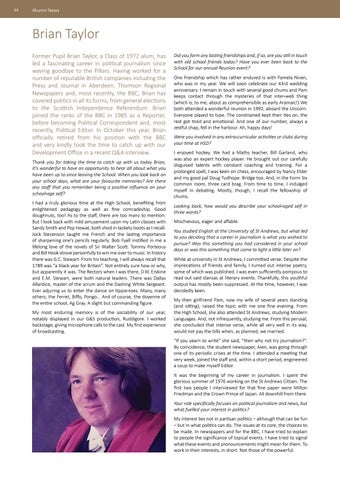44
Alumni News
Brian Taylor Former Pupil Brian Taylor, a Class of 1972 alum, has led a fascinating career in political journalism since waving goodbye to the Pillars. Having worked for a number of reputable British companies including the Press and Journal in Aberdeen, Thomson Regional Newspapers and, most recently, the BBC, Brian has covered politics in all its forms, from general elections to the Scottish Independence Referendum. Brian joined the ranks of the BBC in 1985 as a Reporter, before becoming Political Correspondent and, most recently, Political Editor. In October this year, Brian officially retired from his position with the BBC and very kindly took the time to catch up with our Development Office in a recent Q&A interview. Thank you for taking the time to catch up with us today Brian, it’s wonderful to have an opportunity to hear all about what you have been up to since leaving the School. When you look back on your school days, what are your favourite memories? Are there any staff that you remember being a positive influence on your school-age self? I had a truly glorious time at the High School, benefiting from enlightened pedagogy as well as fine comradeship. Good doughnuts, too! As to the staff, there are too many to mention. But I look back with mild amusement upon my Latin classes with Sandy Smith and Pop Howat, both shod in tackety boots as I recall. Jock Stevenson taught me French and the lasting importance of sharpening one’s pencils regularly. Bob Fyall instilled in me a lifelong love of the novels of Sir Walter Scott. Tommy Porteous and Bill Hook strove personfully to win me over to music. In history there was G.C. Stewart. From his teaching, I will always recall that 1789 was “a black year for Britain”. Not entirely sure how or why, but apparently it was. The Rectors when I was there, D.W. Erskine and E.M. Stewart, were both natural leaders. There was Dallas Allardice, master of the scrum and the Dashing White Sergeant. Ever adjuring us to enter the dance on tippie-toes. Many, many others; the Ferret, Biffo, Pongo… And of course, the doyenne of the entire school, Ag Gray. A slight but commanding figure. My most enduring memory is of the sociability of our year, notably displayed in our G&S production, Ruddigore. I worked backstage, giving microphone calls to the cast. My first experience of broadcasting.
Did you form any lasting friendships and, if so, are you still in touch with old school friends today? Have you ever been back to the School for our annual Reunion event? One friendship which has rather endured is with Pamela Niven, who was in my year. We will soon celebrate our 43rd wedding anniversary. I remain in touch with several good chums and Pam keeps contact through the mysteries of that inter-web thing (which is, to me, about as comprehensible as early Aramaic!) We both attended a wonderful reunion in 1992, aboard the Unicorn. Everyone played to type. The constrained kept their ties on, the rest got tired and emotional. And one of our number, always a zestful chap, fell in the harbour. Ah, happy days! Were you involved in any extra-curricular activities or clubs during your time at HSD? I enjoyed hockey. We had a Maths teacher, Bill Garland, who was also an expert hockey player. He brought out our carefully disguised talents with constant coaching and training. For a prolonged spell, I was keen on chess, encouraged by Nancy Elder and my good pal Doug Tudhope. Bridge too. And, in the Form Six common room, three card brag. From time to time, I indulged myself in debating. Mostly, though, I recall the fellowship of chums. Looking back, how would you describe your school-aged self in three words? Mischievous, eager and affable. You studied English at the University of St Andrews, but what led to you deciding that a career in journalism is what you wished to pursue? Was this something you had considered in your school days or was this something that came to light a little later on? While at university in St Andrews, I committed verse. Despite the imprecations of friends and family, I turned out intense poetry, some of which was published. I was even sufficiently pompous to read out said stanzas at literary events. Thankfully, this youthful output has mostly been suppressed. At the time, however, I was decidedly keen. My then girlfriend Pam, now my wife of several years standing (and sitting), raised the topic with me one fine evening. From the High School, she also attended St Andrews, studying Modern Languages. And, not infrequently, studying me. From this perusal, she concluded that intense verse, while all very well in its way, would not pay the bills when, as planned, we married. “If you yearn to write” she said, “then why not try journalism?”. By coincidence, the student newspaper, Aien, was going through one of its periodic crises at the time. I attended a meeting that very week, joined the staff and, within a short period, engineered a coup to make myself Editor. It was the beginning of my career in journalism. I spent the glorious summer of 1976 working on the St Andrews Citizen. The first two people I interviewed for that fine paper were Milton Friedman and the Crown Prince of Japan. All downhill from there. Your role specifically focuses on political journalism and news, but what fuelled your interest in politics? My interest lies not in partisan politics – although that can be fun – but in what politics can do. The issues at its core, the choices to be made. In newspapers and for the BBC, I have tried to explain to people the significance of topical events. I have tried to signal what these events and pronouncements might mean for them. To work in their interests, in short. Not those of the powerful.































